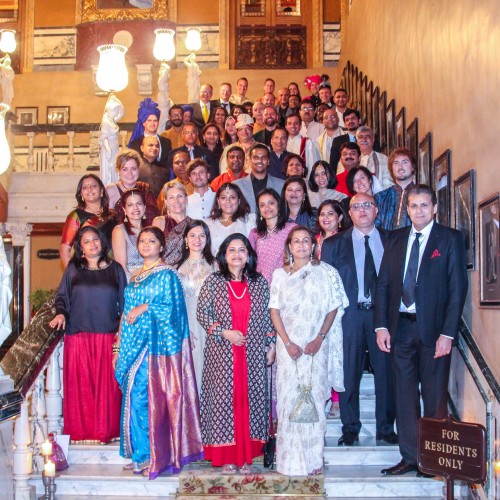Sabre identifies Asia Pacific consumer behaviours driving opportunities for hotels in 2017
The self-improvers embracing locality and lusting for more information – today’s Asia Pacific consumers, tomorrow’s new revenue streams for the hotel industry!
A study released today by Sabre Corporation , in collaboration with TrendWatching, explores a series of quirky ‘behavioural’ trends emerging amongst Asia Pacific consumers which will present new opportunities for hotels in 2017.
These three trends are: ‘Betterment’, a growing consumer desire for self-improvement; ‘Local Love’, taking pride in locality and embracing local products and services; and ‘Infolust’, the appetite for timely, relevant and actionable information exchange to inform better purchase decisions and solicit more personalised services.
“Competition amongst hotels is high in many Asia Pacific markets, despite a positive outlook into 2017 and beyond. Rapid disruption in the range of accommodation options available and an evolution in consumer preferences is putting hotels under pressure to keep innovating. One key way to maintain an edge in a fiercely competitive industry is to identify emerging consumer behaviours that present new opportunities to differentiate the travel ‘experience’,” notes Sarah Kennedy Ellis, vice president of marketing and strategic development for Sabre Hospitality Solutions.
According to global data bench marking and insights firm STR, the Asia Pacific region reported a 1.9 percent year-on-year increase in occupancy in Q3 2016. However average daily rates were down 1.9 percent to US$97.34.
Sabre’s Hospitality Solutions business has identified three behavioural trends amongst Asia Pacific consumers which will present new opportunities for hotels in 2017:
“BETTERMENT”: Asia Pacific economies span the entire development spectrum, but the desire for self-improvement extends across the region.Consumers are striving to improve their lifestyle and satiate a feeling that they could ‘do better’ – living more healthily, recycling more, ‘doing good’ – the list of self-improvement goals is long. However healthier, smarter, more responsible choices are also perceived as costing more. This, combined with human inertia, means action is often lacking.
While self-pressure to ‘do better’ and a sense of accountability amongst peers can exert social pressure, for many consumers the lure of deals or rewards will be the catalyst needed to incentivize action. What if hotels could combine the two – self-improvement choices packaged into a good deal? Discounted rates for guests that support a hotel’s chosen local community programme during their stay? Dining vouchers at a local health food restaurant for guests who use the spa?
“LOCAL LOVE”: The global centre of economic and cultural gravity is shifting. ‘Global Brand’ successes are being driven from Asia not into Asia, such as Alibaba and Samsung. With this evolution, consumer mind-sets towards ‘local’ are also changing. A rising body of Asian consumers are taking more pride in locality, embracing local products and offerings and reinventing the celebration of tradition and culture. As the value placed on local goods and services within Asian markets grows, the availability of good quality local options increases. The hospitality industry is uniquely positioned to benefit.
“A longstanding challenge for travellers has been finding truly local, authentic, experiences – not globalised ‘versions of’. Hotels can tap into the increasing selection of local, and better quality, options to address this need. Through local partnerships they can extend and enhance the guest experience, increasing customer loyalty or room rates, while driving new revenue streams back into the development of ‘localness’ – further fuelling regional economic growth,” comments Sarah.
“INFOLUST”: With the explosion of online and mobile access, today’s consumers are becoming accustomed to the availability of vast amounts of information to inform purchase decisions. But as well as receiving information, consumers are increasingly open to sharing information in exchange for more relevant, personalised, services and recommendations.
Meanwhile the channels available for this exchange are also evolving. Messaging apps such as WeChat and Line will continue to gain users and expand their ecosystem to become a one-stop-platform for lifestyle solutions.
“Look at the amount paid for WhatsApp, the value wrapped up in WeChat – messaging is going to be a big part of the service infrastructure. No apps get opened as often as messaging apps. They’re becoming the portals of everything mobile and a vector for new consumer experiences. Hotels have an opportunity to share travel information, from shopping options to mid-trip services, and engage consumers at every stage of the journey in a virtual channel they’re already in, via the two-way conversation they’re seeking,” adds Sarah.
You might also like
Switzerland Tourism fruitfully conducted a five-city trade show in India
Switzerland Tourism, in an effort to catalyse tourism development across India, has introduced several new attractions, experiences and activities to make travellers familiar with both popular and lesser known destinations
Greece recognized as the Most Popular Destination at OTM India Awards 2020
The OTM India Awards is held annually on the sidelines of the Outbound Travel Market (OTM), a leading travel trade show in India, focused on Indian outbound travel. Greece was recently
Turespaña launches International Tourism Promotion Campaign
Turespaña organization dependent on the Ministry of Energy, Tourism and Digital Agenda has launched “Spain in 10 seconds”, a new tourism promotion campaign which is based on personal recommendations and









